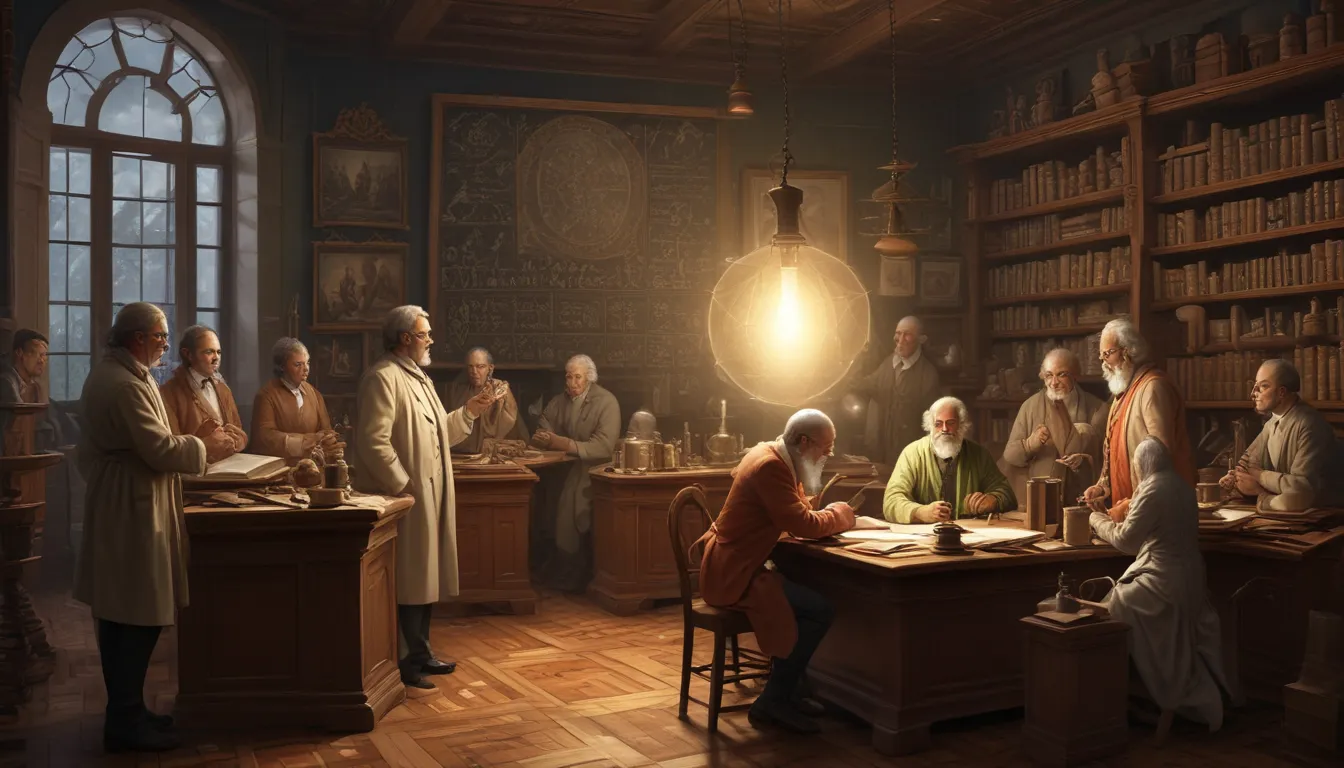The images in our articles may not match the content exactly. They are used to grab your attention, not to show the exact details in the text. The images complement the text but do not replace it.
Have you ever pondered how humanity transitioned from believing in alchemy to embracing the scientific method? The Scientific Revolution stands as a monumental period that reshaped our understanding of the universe. But what lies beneath the surface of this transformative era? From Copernicus proposing the heliocentric model to Newton laying down the laws of motion, the Scientific Revolution signifies more than just new discoveries—it ushered in a whole new way of thinking. Get ready to embark on a captivating journey through history as we unveil some of the most astonishing facts about the Scientific Revolution. Let’s delve into this spellbinding exploration of the past!
Unveiling the Origins of the Scientific Revolution
The Scientific Revolution, a time of significant scientific advancements, revolutionized how individuals perceived the world and their role within it. But what set the stage for this profound shift in thought and understanding?
-
Curiosity and Skepticism: At its essence, the revolution was propelled by a burgeoning curiosity about the natural world and a skepticism of ancient authorities. Scholars began challenging conventional beliefs and sought explanations rooted in observation and experimentation.
-
Technological Advancements: Innovations like the printing press made it easier to disseminate ideas and discoveries, facilitating the propagation of new scientific concepts. Devices such as the telescope and microscope unveiled unseen realms, challenging existing notions of the cosmos.
Visionaries of the Scientific Revolution
Numerous brilliant minds stand out for their contributions to the Scientific Revolution, pushing the boundaries of human understanding of the natural world.
-
Nicolaus Copernicus: Pioneered the heliocentric model of the universe, suggesting that the Earth and other planets orbit the sun, contrary to prevailing geocentric beliefs.
-
Galileo Galilei: Utilized the telescope to make groundbreaking astronomical observations that supported the heliocentric theory and questioned the doctrines of the church.
-
Isaac Newton: Formulated the laws of motion and universal gravitation, establishing the groundwork for classical mechanics.
Revolutionary Breakthroughs and Innovations
The Scientific Revolution not only ushered in novel ways of thinking but also brought about transformative discoveries and inventions that reshaped the world.
-
The Telescope: Galileo’s enhancements to the telescope enabled humans to peer into the heavens with unprecedented clarity, revealing Jupiter’s moons and Venus’s phases.
-
Calculus: Independently developed by Isaac Newton and Gottfried Wilhelm Leibniz, calculus introduced a new mathematical framework for describing motion and change.
-
The Scientific Method: An organized approach to research and experimentation championed by figures like Francis Bacon and René Descartes, emphasizing observation, hypothesis, and experimentation.
Societal and Cultural Impacts of the Scientific Revolution
Beyond expanding knowledge of the natural world, the Scientific Revolution left a lasting imprint on society and culture.
-
Paradigm Shift: It challenged the authority of traditional institutions and ancient scholars, advocating for a worldview based on empirical evidence and rational thinking.
-
Medical Advancements: Enhanced understanding of human anatomy and physiology led to improved medical treatments and the eventual establishment of the germ theory of disease.
-
Influence on the Enlightenment: The emphasis on reason and empirical evidence during the Scientific Revolution contributed to the Enlightenment, an era that valued individualism and critiqued established power structures.
The Enduring Legacy of the Scientific Revolution
The Scientific Revolution laid the groundwork for modern science, shaping the trajectory of humanity in myriad ways.
-
Foundation for Modern Science: It delineated science as a discipline distinct from philosophy and religion, with its own methodologies and standards of evidence.
-
Technological Advancement: Principles uncovered during this era paved the way for future technological progress, spanning from steam engines to electricity.
-
Educational Reform: It influenced the evolution of educational systems, promoting the study of science and emphasizing critical thinking skills.
-
Global Exploration: Scientific advancements facilitated more precise navigation, fostering global exploration and the expansion of European empires.
-
Environmental Awareness: Early considerations of humanity’s impact on the environment emerged from understanding the natural world, forming the basis of modern environmental science.
Reflecting on the Brilliance of the Scientific Revolution
As we traverse the twists and turns of the Scientific Revolution, unearthing nuggets of knowledge that have shaped our world, remember—it wasn’t merely a period of new discoveries. It represented a seismic shift in human perceptions of the universe and our place within it. Visionaries like Galileo, Newton, and Copernicus weren’t just stargazers; they ignited humanity’s unending curiosity and innovation. Their legacy transcends mere facts and theories—it embodies a spirit of inquiry. Let us carry forward this torch of curiosity, fueling our thirst for knowledge and discovery. The Scientific Revolution teaches us that with an inquisitive mind, the horizons of possibility stretch infinitely. Let’s nourish that flame of exploration, for in venturing into the unknown, we unearth the essence of humanity.
Engaging with the Scientific Revolution: FAQs
Q: What instigated the Scientific Revolution?
A: Believe it or not, this monumental shift commenced around the 16th century, catalyzed by individuals like Copernicus who began questioning traditional beliefs and leveraging observations and experiments to comprehend our world.
Q: Who were notable figures during the Scientific Revolution?
A: Oh, there were plenty of luminaries! Galileo Galilei, for instance, played a pivotal role with his research on motion and celestial observations. Then, there’s Isaac Newton, whose laws of motion and universal gravitation were mind-boggling. Don’t overlook Johannes Kepler, with his laws of planetary motion, and Francis Bacon, who championed the scientific method.
Q: Did the Scientific Revolution occur solely in Europe?
A: Primarily, yes. This revolution unfolded predominantly across Europe, where a network of intellectuals and scientists began exchanging ideas that challenged archaic perspectives and formulated novel theories. However, its impact eventually disseminated worldwide, influencing scientific thought and exploration globally.
Q: How did the Scientific Revolution influence daily life?
A: It fundamentally altered how we perceive the cosmos and our position within it. Innovations from this era spearheaded advancements in navigational tools, enhancements in medical knowledge and practices, and the evolution of new technologies. In essence, it laid the groundwork for modern science and technology, enriching our lives with insights and convenience.
Q: What was the role of the printing press in the Scientific Revolution?
A: Monumental, to say the least! Invented by Johannes Gutenberg in the 15th century, the printing press democratized access to books. Consequently, scientific ideas could proliferate at an unprecedented pace, reaching a broader audience. It served as a major catalyst for the propagation of new ideas and knowledge during the revolution.
Q: Are the effects of the Scientific Revolution visible today?
A: Absolutely! Every instance of using a smartphone, receiving a vaccine, or checking a weather forecast embodies the legacy of the Scientific Revolution. Its emphasis on observation, experimentation, and the scientific method forms the bedrock of contemporary science and technology.
Q: Did the Scientific Revolution encounter opposition?
A: Certainly. Many ideas stemming from the revolution directly challenged the teachings of the church and entrenched beliefs. Scientists like Galileo even faced persecution. Despite adversities, the movement persevered, forever reshaping our comprehension of the world.
Your Input Matters!
Our unwavering commitment to delivering reliable and captivating content lies at the heart of our endeavors. Each fact on our platform is contributed by real users like you, enriching our repository with a diverse array of insights and information. Our dedicated editors meticulously scrutinize each submission, ensuring that the facts we present are not only intriguing but also verifiable. Trust in our dedication to quality and authenticity as you embark on a journey of exploration and learning with us.






